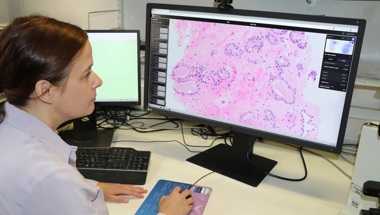Research
22 Oct 2023AI sparks revolution in precision medicine for advanced prostate cancer
Artificial intelligence (AI) tools could enable men to get prostate cancer treatment that’s more personalised to them, saving and extending lives, according to new research from the STRATOSPHere study.

Artificial intelligence tools are ready to help revolutionise the development of personalised treatments for men with prostate cancer, according to groundbreaking new research led by University College London (UCL) and supported with £1.3m from Prostate Cancer UK and Movember.
This means doctors could soon assign a man the most effective treatment strategy for him, tailored to his specific cancer, at the point of diagnosis – rather than the current ‘one-size-fits-all’ approach, where treatments are standardised across groups of men.
This would give men the best chance of a longer and healthier life, reducing unnecessary side effects from ineffective treatments, and potentially saving money for the NHS.
The right treatment at the right time
The advance has been made by researchers working on the STRATOSPHere project, led by Professor Gerhardt Attard at UCL. His team is analysing thousands of tumour and blood samples donated by men during a groundbreaking trial called STAMPEDE, which was led by Professor Nick James at the Institute of Cancer Research.
STAMPEDE tested the effectiveness of different treatments combined with hormone therapy for men with aggressive prostate cancer, to work out which of these combinations was most successful in helping them live longer and feel healthier.
While STAMPEDE was hugely successful in discovering which treatment regimens worked best on average – and has led to more life-lengthening options being made available to men – there was still no way of predicting which of those specific treatments was most effective for any given man.
As a result, men who were not responding to treatments were still dying, making it essential to identify them sooner.
The STRATOSPHere team, working with Professor James, has now made a significant leap forward in finding these men by analysing the data from STAMPEDE with a revolutionary AI tool from US company ArteraAI.
With this, they were able to identify which men were responding to treatment and, crucially, which men weren’t – and who therefore should be part of further clinical trials, testing more intensive treatments designed specifically for them.

Advance could be a ‘game-changer’
Professor Attard explained: “We are working to unravel the biological characteristics and differences between the cancers of the individual men on the STAMPEDE trial, with a view to predicting which precise, personalised treatments will work best for each man.
“With the help of models derived from artificial intelligence, we have been able to obtain new information from materials that we already have in the course of standard clinical practice, such as tissue samples. This new knowledge can enable us to accurately predict how specific cancers – and therefore which men – will respond best to treatment combinations physicians now routinely use thanks to the crucial work of STAMPEDE.
“This ability to better predict the behaviour of a cancer from routinely performed tests could be a game-changer.”
Dr Matthew Hobbs, Director of Research at Prostate Cancer UK, commented: “1 in 8 men will get prostate cancer, but the disease is seriously lagging behind other cancers in terms of precision medicine, a situation which is causing avoidable death and harm. We very deliberately invested with Movember in 2017 to try to close this gap by funding STRATOSPHere, and I’m delighted to see such impressive and impactful results coming from that decision.
“I’m particularly excited to see the opportunity brought by combining excellent UK clinical research, careful and deliberate research funding, and innovative AI technology. This combination now sets the path for the next generation of clinical trials for men with very aggressive prostate cancer, bringing us closer to effective, personalised treatments being the norm for every man, sooner than we thought possible.”
This ability to better predict the behaviour of a cancer from routinely performed tests could be a game-changer.
Treatment precisely tailored to the unique biology of a man’s cancer
Andre Esteva, CEO of ArteraAI, said: "ArteraAI is thrilled to be part of the STRATOSPHere project, contributing to the acceleration of precision treatments that hold the promise of transforming the lives of men battling advanced prostate cancer.
“The mission of enabling personalized care aligns perfectly with our vision for a future where every man facing this disease can receive medicine precisely tailored to the unique biology of their cancer.”
Dr Sarah Hsiao, Director Biomedical Research and Impact at Movember, commented: “Being able to predict what might happen for men with aggressive prostate cancer is incredibly important. Movember is proud to have supported the STRATOSPHere team’s innovative research, which employs state-of-the-art technology to develop a tool that can assist men with prostate cancer and their doctors to make the most informed treatment choices.
“This is a significant step towards the concept of providing the right treatment for the right men at the right time. We look forward to further research on how this could be applied in the standard healthcare practices to improve outcomes for prostate cancer.”





